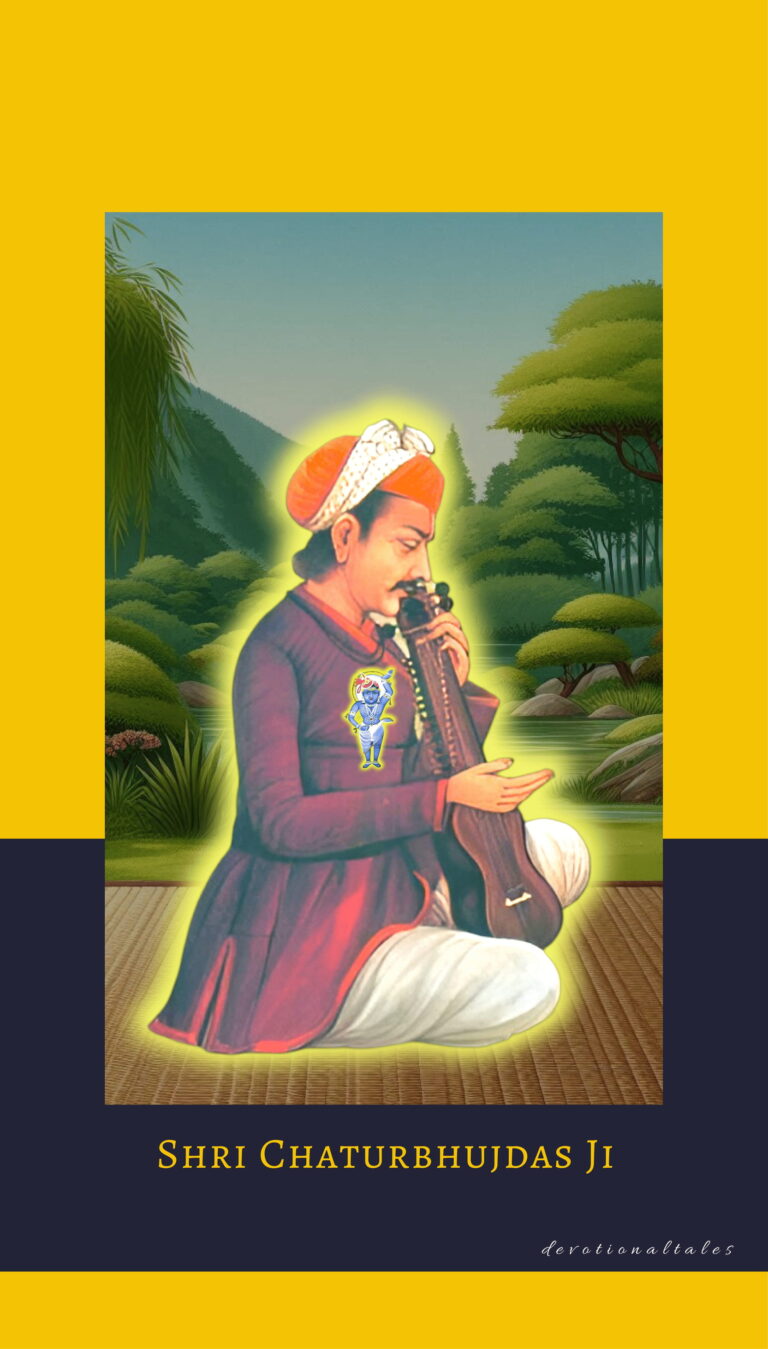
Shri Chaturbhujdas Ji (Asht-sakha)
The Birth of Shri Chaturbhujdas Ji
In the sacred year of 1597, in the serene village of Jamunavata, a remarkable soul took birth — Shri Chaturbhujdas Ji. He was born into a family already touched by spiritual greatness.
His father was none other than Shri Kumbhandas Ji, a legendary poet and one of the celebrated eight Ashtachap poets and a topmost saint devoted to the divine service of Lord Shri Krishna.
From the very moment of his birth, young Chaturbhujdas Ji showed signs of divine inclination. His heart beat in rhythm with the name of Shrinathji.
As he grew, his path became clear. He became the disciple of Gusain Shri Vitthalnathji.
In time, Shri Chaturbhujdas Ji earned his place among the Ashtachap poets of Pushtimarg, the highly elevated group of eight poet-devotees whose verses continue to echo in the temples and hearts of the faithful.
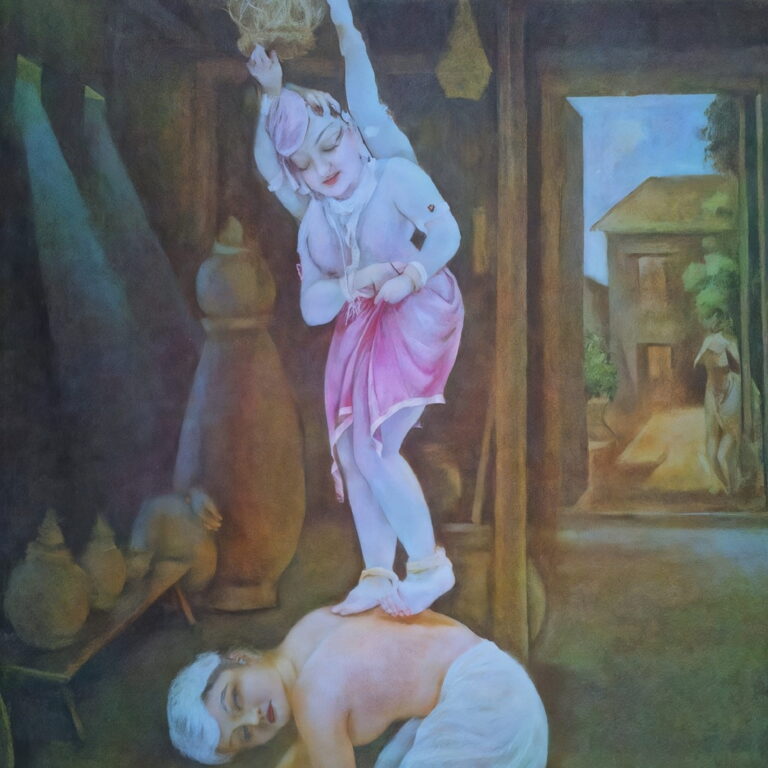
The mystery behind the name "Chaturbhujdas"
Shrinathji would mischievously lead His beloved devotee Kumbhandasji to the homes of the Gopis in Braj, where together they delighted in stealing butter — a playful divine pastime filled with laughter and hidden joy.
One such day, as the two friends sat together in their usual ease, Kumbhandasji looked at the Lord and asked with a smile,
“Lala, where are we going today?”
Shrinathji replied,
“Kumbana, let’s go to your village — Jamunavata!”
At once, Kumbhandasji’s face changed. He laughed nervously and said,
“Maharaj, you’ll get me beaten! Everyone in Jamunavata knows me. You’re mischievous — you’ll run away, and then I’ll be the one left behind to get scolded every time!”
But the Lord only laughed and pulled him along.
Together, they reached a milkmaid’s house in Jamunavata, where a pot of butter was tied high above. Shrinathji, eyes twinkling, said,
“Kumbana, become a horse! I’ll climb on you and steal the butter.”
And so Kumbhandasji, completely devoted, bent down like a horse. The Lord climbed onto his back, reaching for the pot. But the butter pot was tied just a bit too high, and as Shrinathji stretched to grab it, He had to exert some extra strength.
In that moment, Shrinathji’s yellow dhoti began to slip. Both His hands were holding butter pots — He couldn’t free them to fix His dhoti.
And then—in a divine instant—Shrinathji manifested two more arms!
With His newly revealed Chaturbhuj (four-armed) form, He held onto His slipping dhoti and balanced the butter pots at the same time.
Kumbhandasji, still crouched below, looked up and froze.
In wonder, he witnessed the majestic Chaturbhuj form of the Lord, a vision only possible through pure devotion — a leela so intimate and playful, yet drenched in the wonder of divine reality.
After the butter was successfully “stolen” and the joyous leela completed, the two returned from their adventure.
No sooner had they arrived, a villager came rushing to give news:
“A son has been born to you, Kumbhandasji!”
Overwhelmed with joy and wonder — still shaken by the divine vision he had just witnessed — Kumbhandasji knew at once what the child’s name must be. With trembling lips, he whispered:
“Chaturbhujdas.”
A name that captured both the leela of the Lord and the love of a devotee.
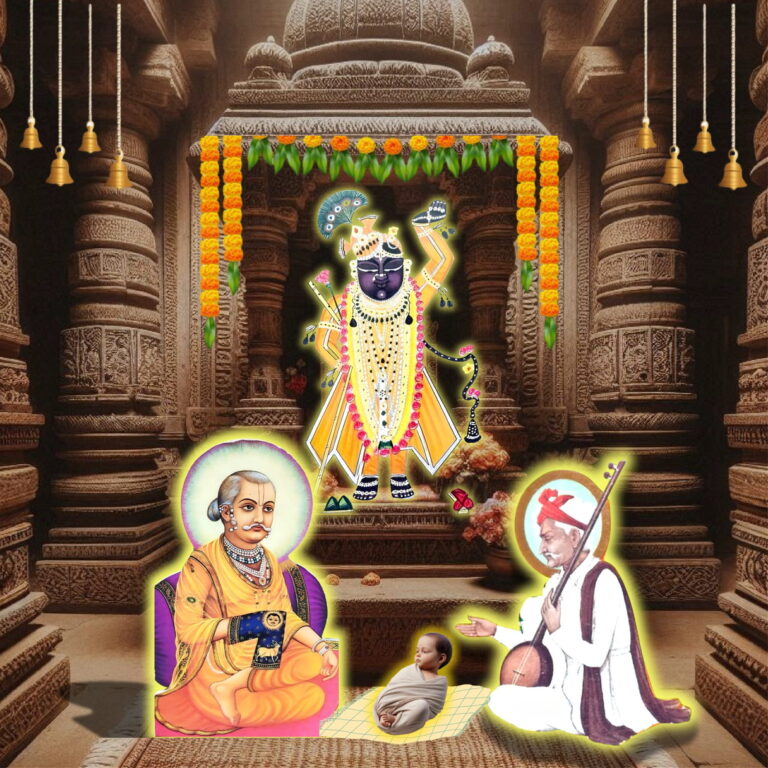
Spiritual Initiation (Eleven Days Old, Eternally Chosen)
At just 11 days old, the sacred journey of Shri Chaturbhujdas Ji began.
His great father, Shri Kumbhandas Ji, carried him in his arms and approached Gusain Shri Vitthalnath Ji. There, in an atmosphere drenched in divine presence, Gusain Ji performed the initiation ceremony, formally welcoming the newborn into Pushtimarg.
Exactly 30 days later, when Chaturbhujdas Ji was 41 days old, Kumbhandas Ji returned.
This time, he gently laid his son at the lotus feet of Shri Gusain Ji, offering him wholly in love and surrender.
In that sacred moment, Gusain Ji offered Chaturbhujdas Ji to Shrinathji Himself.
And from that day onward, Chaturbhujdas Ji’s life was no longer ordinary.
Shrinathji showered such divine grace upon him that the impossible became natural —
The infant, Chaturbhujdas Ji (only 41 days old), began to speak.
One moment he would behave like a typical newborn, gurgling and cooing softly, and in the next, he would utter profound spiritual truths, speaking of divine leelas and mystical realms far beyond the understanding of mortal minds.
In moments of stillness, when Kumbhandas Ji sat alone, Chaturbhujdas Ji would appear beside him and speak vividly of the pastimes of the Lord. But if another person approached or interrupted the sacred conversations, Chaturbhujdas Ji would immediately shift back into an innocent state, as an enchanted child.
At times, Shrinathji Himself would take Chaturbhujdas Ji to play with Him. Whenever he witnessed the leelas of Shrinathji, Chaturbhujdas Ji would later sing the very same verses.
Thus began a life woven into the divine, where even infancy danced in the presence of the eternal.
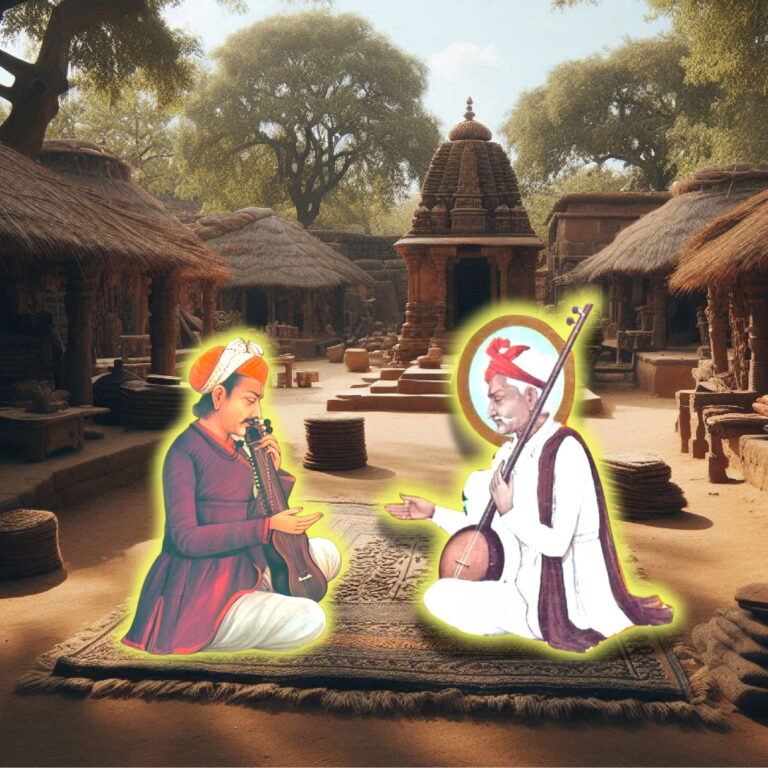
Beholding the Divine Play of Shrinathji All Around
From the very day Shri Chaturbhujdas Ji was graced with his first vision of Shrinathji’s divine leela, from that day onwards he began to see all the divine pastimes of the Lord everywhere.
Shrinathji had blessed him with such extraordinary grace that everywhere he looked, he saw the Lord’s pastimes unfolding — in the rustling trees, in dancing shadows, in the hum of daily life, and even in silence.
One day, his father, the revered poet-devotee Shri Kumbhandas Ji, was immersed in a divine vision, where Shrinathji was resting peacefully.
Overwhelmed by the serene beauty of this internal leela, he began to sing with heartfelt devotion:
“Ve Dekho Barat Jharokhan Deepak Hari Podhe Unchi Chitrasari”
– “Look there, the lamp is burning behind the curtains and the Lord is sleeping”
As the words flowed from his lips, Chaturbhujdas Ji, who had been silently nearby, suddenly joined in — his voice rising with an ethereal sweetness that surprised even Kumbhandas Ji:
“Gaaye Uthe Sundar Badan Niharan Karan Bahut Yatan Rakhe kar Pyari”
At that moment, Kumbhandas Ji understood something monumental:
Chaturbhujdas Ji’s spontaneous continuation of the verse, perfectly aligned with his (Kumbhandas Ji’s) internal experience, which revealed that he too was watching the same divine leela unfold — with the vision bestowed by divine grace.
And this was the grace of Gusain Shri Vitthalnath Ji.
From that day forward, Kumbhandas Ji no longer questioned his son.
Whether Chaturbhujdas Ji stayed at home or wandered outside, returned early or came home late — he never asked.
Why?
Because in his heart, he knew — Chaturbhujdas Ji was with Shrinathji, wherever he was.
Perhaps playing with Him, perhaps singing to Him, perhaps watching a leela known only to the blessed.
He had entered a state beyond rules and routines — a life intertwined with the eternal play of the Lord.
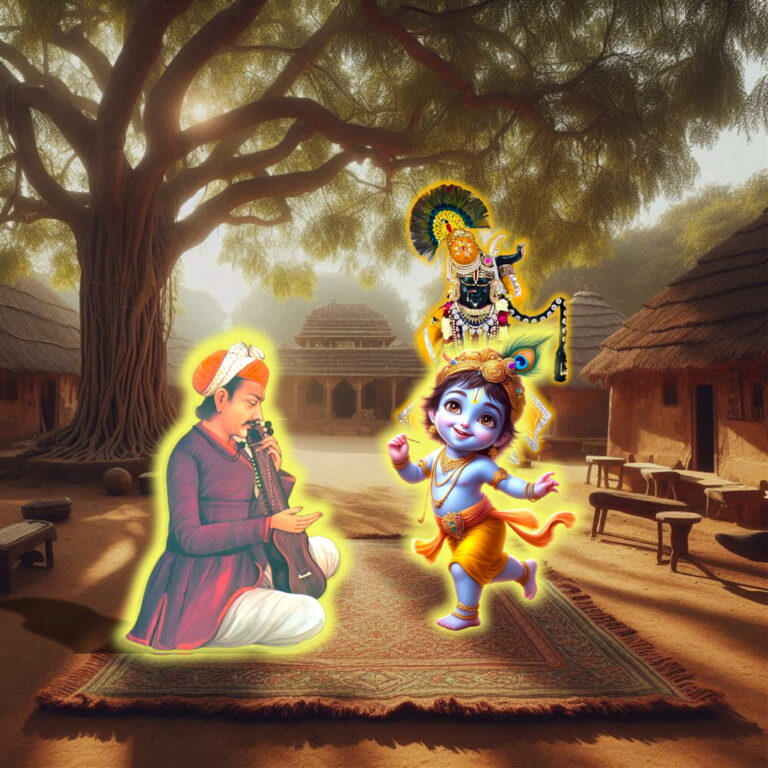
The Ever-New Darshan
Beholding Shrinathji never felt the same for Shri Chaturbhujdas Ji — because it never was.
One day, after adorning the Lord, Shri Gusain Ji held a mirror before Shrinathji. Standing at a distance in the courtyard, Chaturbhujdas Ji watched in quiet awe, then suddenly broke into a soul-stirring verse:
“Subhag Shringar Nirakh Mohan Ko Le Darpan Kar Piyahi Dikhaaven.
Aapu Na Nek Nihaari Ye Balijaoon Aaj Ki Chhavi Kachhu Kahat Na Aaven.”
– “The Sakhi shows a mirror to Shri Krishna and admires how beautifully He is dressed. I surrender myself to this beauty — His divine look today is too wonderful to describe in words.”
Later that day, at Govind Kund, a curious Vaishnava asked Shri Gusain Ji,
“Maharaj Ji, why did Chaturbhujdas Ji say ‘Today’s beauty cannot be described’? Doesn’t the Lord always appear the same?”
Smiling, Shri Gusain Ji gently replied,
“Go and ask Chaturbhujdas yourself.”
When asked, Chaturbhujdas Ji gently sang:
“Mayi Ri Aaj Aur Kaal Aur Chhinachhin Prati Aur Aur”
– “O Sakhi, what can I say about today or yesterday? Shrinathji’s beauty looks new and fresh every single moment.”
The Vaishnava returned, confused,
“If God’s leelas are eternal and unchanging, why did he say ‘ever new’?”
Shri Gusain Ji explained,
“That is the uniqueness of divine pastimes — they are eternal, yet appear new each moment. And the devotee who experiences them finds fresh joy every time.”
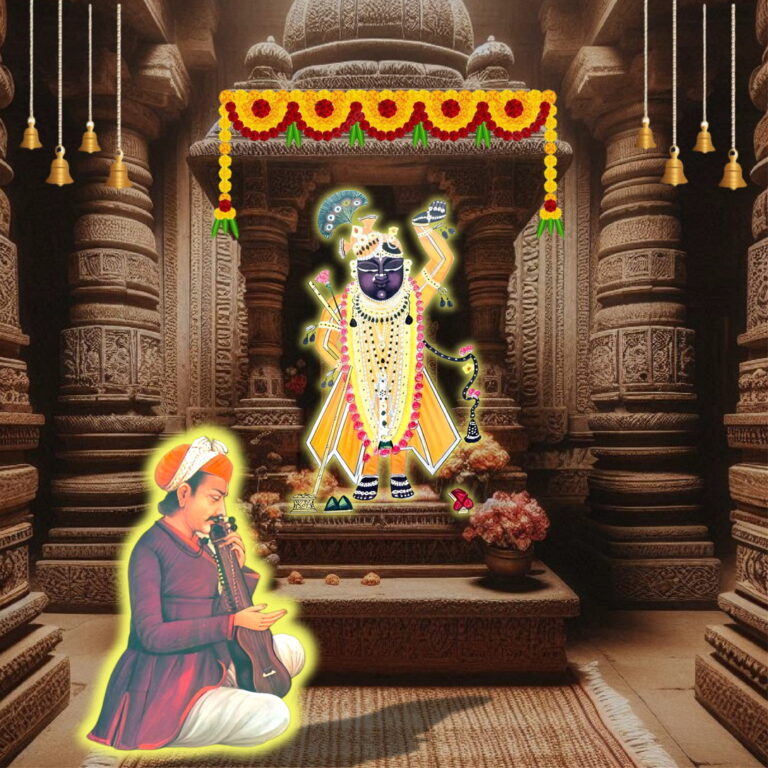
When Shrinathji Woke Up to Hear His Devotee
One day in Gokul, Shri Gusain Ji sat peacefully while all his sons were at the Shrinathji Temple in Govardhan.
At the same time, a Ras Mandali (a musical group for Raas Leela) arrived.
Inspired, Shri Gokulnathji took permission from Shri Giridhar Ji and organized a Raas Leela pastime in the village of Parasauli.
As the divine verses filled the air, Gokulnathji turned to Chaturbhujdas Ji and said,
“Why don’t you sing something as well?”
Chaturbhujdas Ji replied with heartfelt honesty,
“How can I sing, when Shrinathji—who always listened to my verses—is not here?”
Gokulnathji smiled knowingly,
“Don’t worry. Shrinathji will be here soon.”
To fulfill this declaration, Lord Shrinathji Himself awoke in the temple. He gently awakened Giridhar Ji and together, unseen by others, they made their way to Parasauli.
Only Gokulnathji and Chaturbhujdas Ji were able to see the divine presence of the Lord.
With a heart full of joy, Chaturbhujdas Ji began to sing:
“Adbhut Nat Bhesh Dhare.
Yamuna Tat Shyamasundar Gunanidhan Girivaradharan Raas Rangarachen.”
– “Shri Krishna, full of divine virtues, is dressed in a wonderful outfit and dancing on the banks of the Yamuna!”
“Pyari Greeva Bhujmel Nrityat Priyasujan.”
– “With His arm gently around Shri Radharani’s neck, He dances in divine ecstasy.”
Chaturbhujdas Ji continued to sing many such verses. The Raas Leela glowed with divine joy that night.
Such was the deep devotion of Shri Chaturbhujdas Ji that he sang only in the divine presence of Shrinathji—never anywhere else.
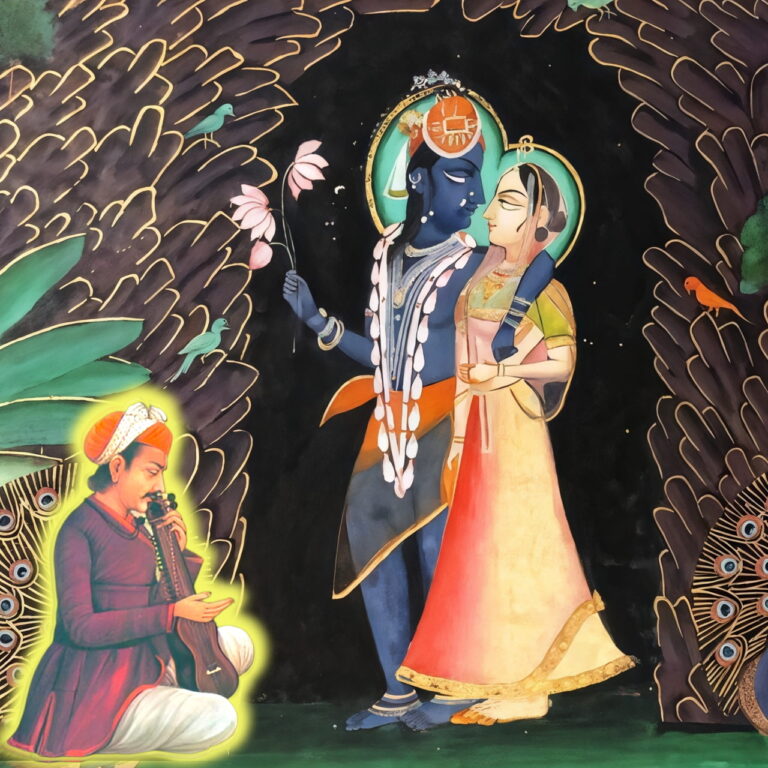
The Secret Darshan: Hidden in Govardhan’s Caves
One day, Shri Gusain Ji instructed Chaturbhujdas Ji,
“Go to Apsara Kund, ask Ramdas Bhitaria to come here, and on your way back, bring some flowers as well.”
Chaturbhujdas Ji promptly sent Ramdas Ji to Shri Gusain Ji and went himself to collect flowers.
As he walked through the serene beauty of Shri Govardhan, something wondrous occurred—Lord Shrinathji and Shri Swamini Ji (Shri Radharani) came out from the cave.
Swamini Ji believed no one had seen this divine moment. But at that very instant, Chaturbhujdas Ji appeared and, blessed with divine sight, began singing:
“Govardhan Giri Saghanakandara Rain Nivaas Kiyo Piypyari.”
He followed it with another verse:
“Rajani Raajkiyo Nikunjnagarki Rani”
Shri Swamini Ji was very pleased and delighted by this spontaneous offering of devotion (verses).
After this blessing moment, Chaturbhujdas Ji returned to Shri Gusain Ji with the flowers.
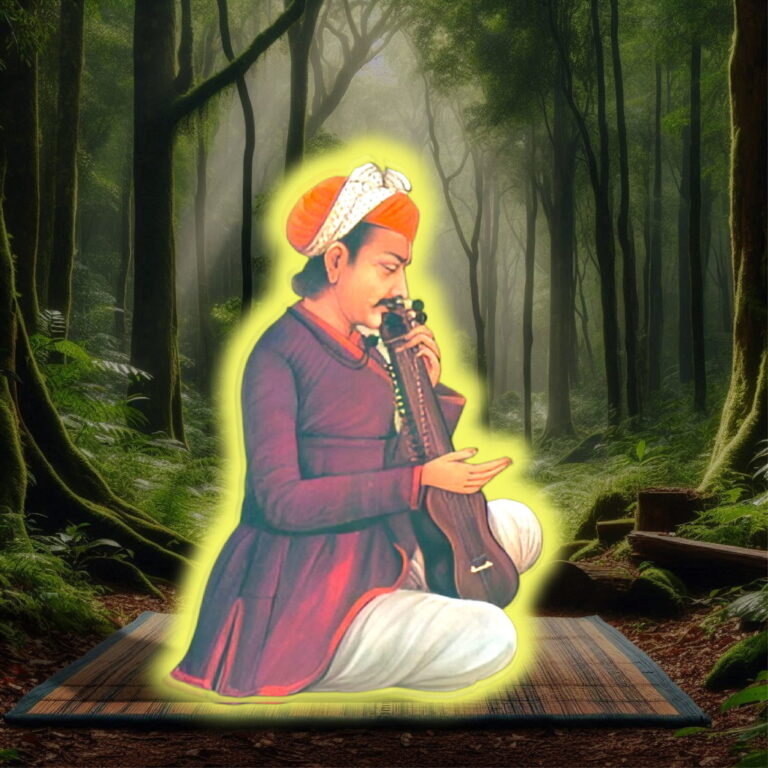
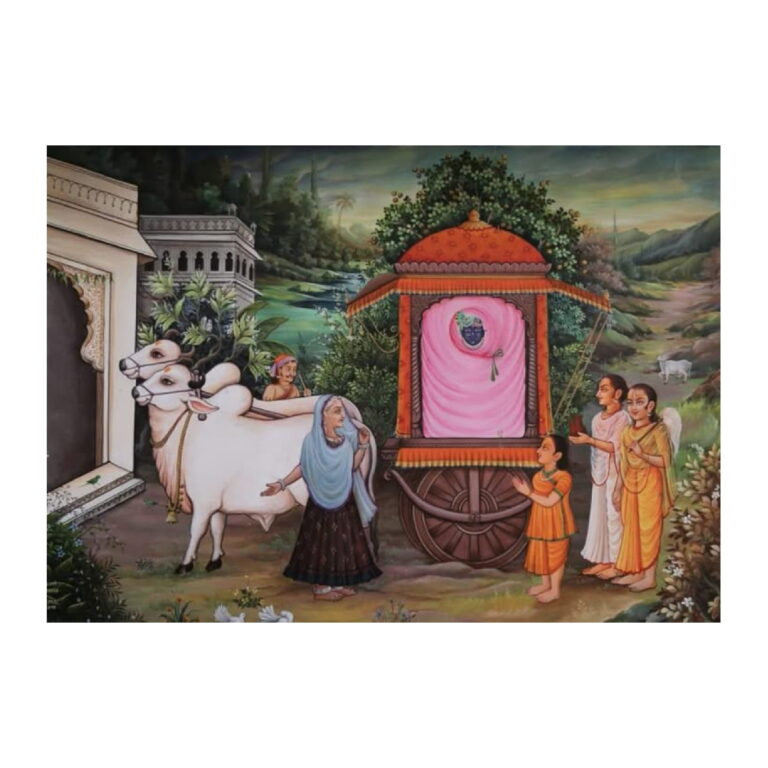
Chaturbhujdas Ji's Longing: The Day Shrinathji Returned
Once, while Shri Gusain Ji was outside Govardhan, Giridhar Ji (his great son) felt an intense desire to bring Shrinathji to his home in Mathura.
With Shrinathji’s permission, he performed the evening Shayan Aarti and brought Him to Mathura on the sixth day of the dark fortnight in Phalgun (March–April).
The very next day, Giridhar Ji hosted a grand celebration, surrendering all that he had, to Shrinathji.
But far away, on Govardhan Mountain, Shri Chaturbhujdas Ji sat in solitude, singing verses of separation.
Every evening, Shrinathji secretly visited Govardhan just to listen to his verses and grant him divine darshan.
Then, on the 13th day of the bright fortnight in Vaishakh (April–May), Chaturbhujdas Ji sang a verse called:
“Shri Govardhan Vasi Saanvre,
Laal Tum Bin Rahyo Na Jaay Ho.
Vrjaraaj Ladhaite Ladale…..”
– “I can’t live without You, O Govardhanwasi Shri Krishna.
I truly can’t live without You, O beloved son of Nanda.
I truly can’t live without You, O beloved son of Nanda.
O Vrajendranandan, please show me Your beautiful face and that sweet smile.
My eyes are restless, like a fish without water.
Every moment feels like an aeon without You.
I can’t live without You, O beloved of Nanda.”
My eyes are restless, like a fish without water.
Every moment feels like an aeon without You.
I can’t live without You, O beloved of Nanda.”
When Shrinathji heard this verse, His heart was moved with tender compassion. Overwhelmed by the pain of separation in Chaturbhujdas Ji’s voice, He could not remain still.
In that moment, the Lord resolved within Himself,
“I shall stay at Govardhan forever, for I cannot bear to see My beloved devotee in such sorrow.”
The next day, just before dawn (during Brahma Muhurta), Lord Shrinathji told Giridhar Ji,
“Today I will have Rajbhog (lunch) at Govardhan.”
Though the temple was readied with care, the preparations took longer than expected. Thus, Shrinathji was offered both Rajbhog (lunch) and Shayan Bhog (dinner) together, with heartfelt devotion and deep reverence.
From that day till today, on the day of Narasimha Chaturdashi, Shrinathji receives two offerings of Rajbhog—a tradition born out of pure love.
Indeed, Chaturbhujdas Ji was a devotee so beloved that even the Lord Himself could not bear to be away from him.
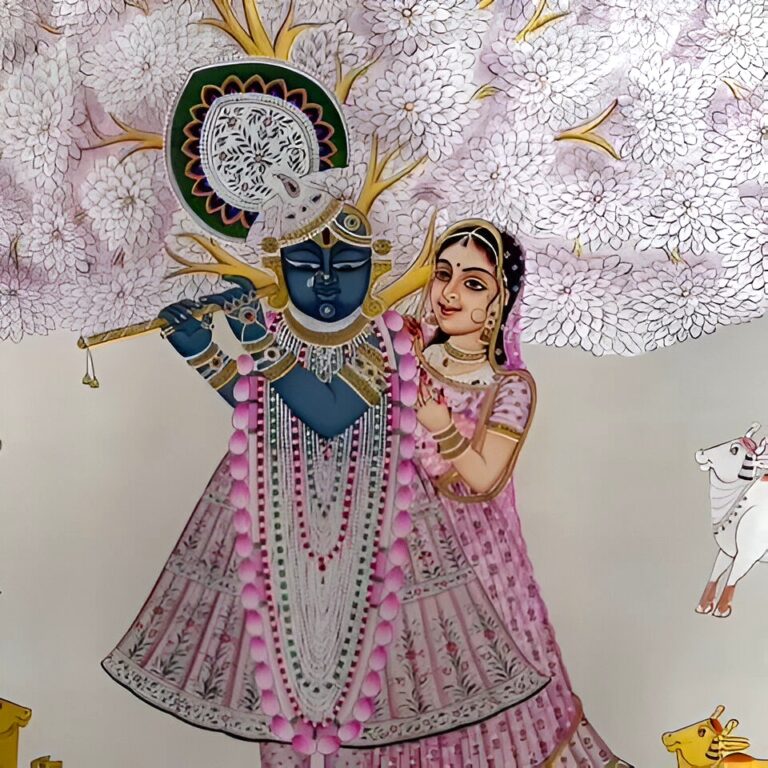
A Family Blessed with Devotion
In the deeply spiritual household of Shri Chaturbhujdas Ji, devotion to God wasn’t just a practice—it was the very soul of the family. Each member lived a life immersed in divine love, their every action reflecting a sacred bond with the Lord.
Among them was Raghavdas Ji, the son of Shri Chaturbhujdas Ji.
He was a true devotee, whose heart danced with the Shrinathji’s divine pastimes.
One day, overwhelmed by the vision of Shri Krishna’s leelas, he composed and began to sing a sacred Dhamar—a devotional poetic form often sung with deep emotion.
With a voice filled with longing and love, Raghavdas Ji sang:
“Ae Chal Jaen Jahan Hari Kreedat Gopin Sanga”
– Come, let us go where Lord Hari plays joyfully with the Gopis.
The moment he completed the tenth verse of his Dhamar, Raghavdas Ji left his mortal body and his soul had merged into the eternal pastimes of Shri Krishna, the very vision he had sung of.
After Raghavdas Ji’s divine departure, his daughter—moved by the moment and perhaps divinely inspired—sang one and a half more rhymes. She completed the Dhamar verse which his father had begun.
This is the extraordinary devotion of Shri Chaturbhujdas Ji and his family.
From father to son to daughter, their bond with the Lord, transcended the physical world. They didn’t just follow a tradition—they breathed it, sang it, and became part of the divine play itself.
Such was the devotional legacy of Shri Chaturbhujdas Ji’s family.
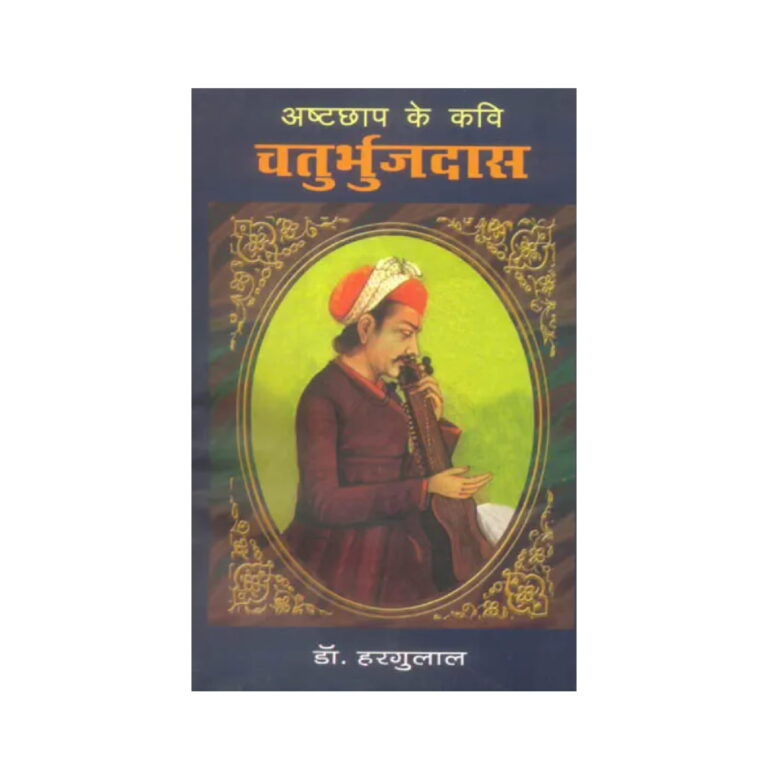
Compositions of Shri Chaturbhujdas Ji
With a heart full of divine love and a mind immersed in the eternal leelas of the Lord, Shri Chaturbhujdas Ji created 400 sacred verses that continue to inspire, uplift, and awaken countless souls.
Each composition was more than poetry, a glimpse into the spiritual ecstasy that he lived every moment of his life.
His verses stand today not just as writings, but as living echoes of devotion.
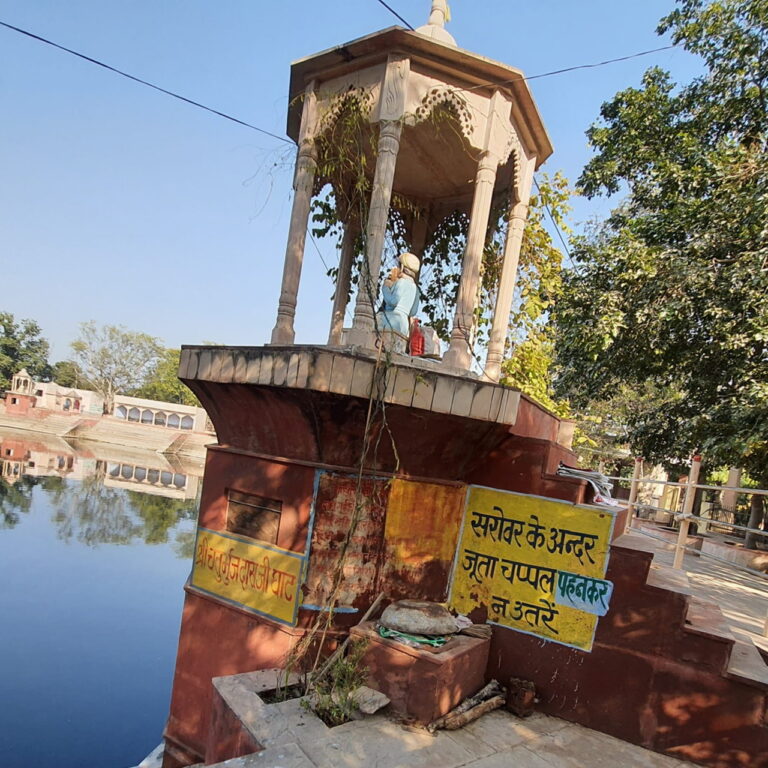
Disappearance :
In the year 1642, at the age of 45, Shri Chaturbhujdas Ji left his physical body and entered the divine pastimes of the Lord, just as he had sung about and lived for throughout his life.
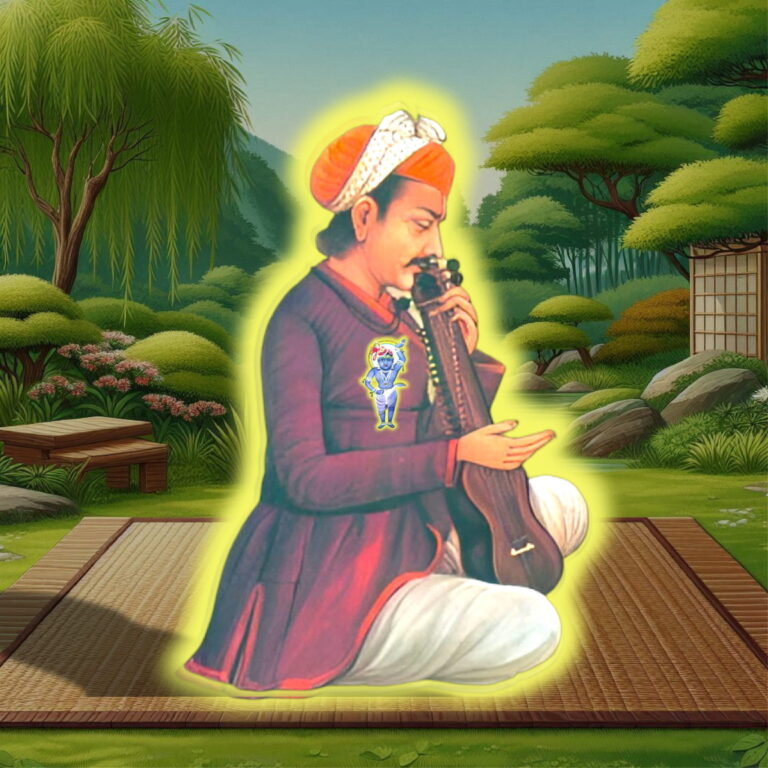
Few Verses of Shri Chaturbhujdas Ji
Dekho Maai Sundarta Ko Punj.
Ang Ang Prati Amrit Madhuri, Dekhi Madan Bhayo Lunj.
Ang Ang Prati Amrit Madhuri, Dekhi Madan Bhayo Lunj.
– Behold, dear friend, the very embodiment of beauty—Shri Krishna Himself! Every part of His divine form overflows with sweetness so enchanting, beholding which even Cupid is put to shame.
Nakh Sikh Subhag Singaar Banyo Hai, Sobha Mani Gan Runj.
‘Chaturbhuj’ Prabhu Giridharan Laal Sir, Laal Tipaarau Gunj.
‘Chaturbhuj’ Prabhu Giridharan Laal Sir, Laal Tipaarau Gunj.
– From head to toe, His adornments are elegant and shining like radiant jewels.
Shri Chaturbhujdas describes how a splendid red turban graces Shri Krishna’s head, while a graceful necklace of gunja beads rests upon His neck.
– Shri Chaturbhujdas Ji
———–
Shri Govardhan Vasi Saanvre Laal, Tum Bin Rahyo Na Jaay Ho….
Vrjaraaj Ladhaite Ladale.
Vank Chite Musakaaye Ke Laal Sundar Badan Dikhaye.
Lochan Talaphen Meen Jyon Laal Palachhin Kalp Vihaaye. Are… Vrjaraaj Ladhaite Ladale. (1)
– O Govardhanvaasi Shri Krishna, I cannot live without You—truly, I cannot, O beloved son of Nanda.
O Vrajendranandan, please show me Your enchanting face adorned with that sweet, divine smile. My eyes, restless like fish out of water, long for just a glimpse of You, and every moment apart from You stretches like an age (aeon).
I cannot live without You, O beloved of Nanda.
Saptak Svar Bandhaan Son Mohan Venu Bajaaye.
Surat Suhai Baandhike Nek Madhuren Madhuren Gaaye. Are… Vrjaraaj Ladhaite Ladale. (2)
– O Manmohan, You have played the seven sacred notes on Your flute, and that melody is beyond sweet—I cannot live without You, O beloved of Nanda.
Rasik Rasili Bolani Giri Chadh Gaay Bulaaye.
Gaay Bulaavai Dhoomari Kachhu Oonchi Ter Sunaaye.Are… Vrjaraaj Ladhaite Ladale. (3)
– O Rasik Shekhar, You climb atop Giriraj Ji and call the cows in the tender, loving voice— “Ari Dhumri, where are you?”
—O dear beloved of Nanda, I cannot live without You.
Drashtipare Ja Divas Te Tabate Ruchi Na Aan.
Rajani Neend Na Aavahin Mohi Visaryo Bhojanpaan. Are… Vrjaraaj Ladhaite Ladale. (4)
– O Krishna, ever since my eyes first saw you, I have forgotten food and water.
Sleep no longer touches my eyes through the night.
I cannot live without You, O beloved of Nanda.
Darasan Ko Naina Tapen Vachan Sunan Ko Kaan.
Milave Ko Jiyara Tapai Jiya Ke Jeevan Praan. Are… Vrjaraaj Ladhaite Ladale. (5)
– My eyes burn in longing for Your sight, my ears wait endlessly to hear Your voice.
O my very life, my heart aches, set ablaze with the desire to meet You.
I cannot live without You, O beloved of Nanda.
Pooran Shashi Mukh Dekhke Chit Chohatyo Vaahi Or.
Roop Sudharas Paan Ko Jaise Kumud Chakor. Are… Vrjaraaj Ladhaite Ladale. (6)
– Seeing Your lotus face—radiant as the full moon—has captured my mind.
Like the chakor bird yearns only for moonlight, so do I wait only for Your moon-like face.
I cannot live without You, O beloved of Nanda.
Man Abhilasha Yah Rahai Lagai Na Nain Nimesh.
Ik-tak Dekhoon Bhaamato Natavar Nagar Bhesh. Are… Vrjaraaj Ladhaite Ladale. (7)
– O sweet Nandnandan, my eyelids no longer know rest.
Even for a fleeting moment, my heart longs to behold the beauty of Your divine form.
I cannot live without You, O beloved of Nanda.
Lok Laaj Vidh Vedhiken Chhaandyo Sakal Vivek.
Kamal Kali Ravi Jyon Badhai Chhin Chhin Preeti Visesh. Are… Vrjaraaj Ladhaite Ladale. (8)
– O Nandnandan, I have left behind worldly duties and shame.
Just as the lotus bud opens more with the rising sun, so does my love for You grow with every passing moment.
I cannot live without You, O beloved of Nanda.
Kotik Manmath Vaaranen Dekhi Dagamagi Chaal.
Yuvati Janaman Phandana Ambuj Nayan Vishal. Are… Vrjaraaj Ladhaite Ladale. (9)
– Millions and millions of Cupids surrender before Your cheeky way of walking.
Your wide lotus eyes have stolen the hearts of Vraja’s maidens.
I cannot live without You, O beloved of Nanda.
Kunj Bhavan Krida Karo Sukhnidhi Madan Gopal.
Ham Vrindavan Maalati Tum Bhogi Bhramar Bhuaal. Are… Vrjaraaj Ladhaite Ladale. (10)
– O Madan Gopal, it is my heart’s deepest wish—
That when You play joyfully in the lush groves of Vrindavan,
I may serve You as a creeper of flowers.
I cannot live without You, O beloved of Nanda.
Yah Ratalaagi Ladile Jaisain Chaatak Mor.
Premneer Varashaavaho Navaghan Nand Kishor. Are… Vrjaraaj Ladhaite Ladale. (11)
– Just as chataks and peacocks gaze toward the sky and sing, with the desire for the rain,
So do I keep chanting Your name, O son of Nanda.
Please, like a fresh monsoon cloud, shower me with the rain of Your love!
Yug Yug Avichal Raakhiyo Yah Sukh Shail Nivaas.
Shri Govardhan Dhar Roop Pe Baljaay Chaturbhuj Das. Are… Vrjaraaj Ladhaite Ladale. (12)
– “May I always remain here in blissful service near You—on the sacred Sri Govardhan Mountain.”
With folded hands, Shri Chaturbhujdas bows before the beautiful Shri Krishna,
The Upholder of Giriraj Ji, in complete surrender.
– Shri Chaturbhuj Das Ji
